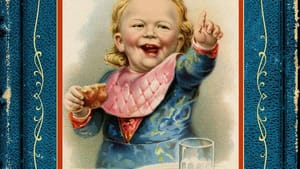Stay in the Loop
BSR publishes on a weekly schedule, with an email newsletter every Wednesday and Thursday morning. There’s no paywall, and subscribing is always free.
Philly's root-beer baron
'Charles E. Hires and the Drink that Wowed a Nation,' by Bill Double

Charles Elmer Hires (1851-1937) did not invent root beer, but made his name synonymous with the fizzy beverage through ambition and foresight. The druggist-turned-entrepreneur, who established a series of successful products in tumultuous times, is the subject of Bill Double’s Charles E. Hires and the Drink that Wowed a Nation: The Life and Times of a Philadelphia Entrepreneur.
Using Hires’s signature product as a unifying thread, Double weaves a story of commerce, consumption, manufacturing, and marketing as the 19th century turned into the 20th. Born the sixth of ten children on a New Jersey farm, Hires was never destined to be a farmer. His professional life played out against the backdrop of urban growth, industrialization, the Progressive era, World War I, Prohibition, and the Great Depression.
Hires was no more attracted to the pen than the plow. He wrote no memoir and kept no diary, forcing the author to look beyond the man and chronicle the age in which Hires Root Beer flourished.
Double provides a thorough account from public sources, but the narrative lacks personal details that would bring Hires to life on the page. Though his central character remains somewhat remote, Double provides a multilayered picture of Hires’s world.
Hires left the farm at 12 to be a pharmaceutical apprentice, exposed to the profession by two druggist brothers-in-law. He eventually moved to Philadelphia, studied at the Philadelphia College of Pharmacy and Jefferson Medical College while working, and by 21, had saved enough to open a drugstore.
At 24, Hires introduced his root beer at the 1876 Centennial Exposition. It was the best-known of several successful enterprises, including botanicals, flavorings, evaporated milk, and spring water. His descendants sold the company in 1960 for $7.3 million.
The vision thing
Hires’s life is a case study in entrepreneurial success. He possessed a unique combination of skills that enabled him to conceive and sustain successful ventures long before the arrival of angel investors and business incubators.
He was curious and loved to experiment. Hires recognized the value of branding and the need to protect established brands from competitors. He stressed quality in ingredients: using real vanilla, for example, when competitors substituted cheaper artificial flavoring.
Hires believed in advertising, investing heavily in newspaper and magazine ads, as well as trade cards, billboards, point-of-sale signage, and novelties. Within 10 years, Hires Household Extract, the original dry mix from which root beer could be home-brewed, was a national brand.

Treasure from trash and tea
Success began on a walk in 1872, when Hires passed a mound of excavated potter’s clay at a construction site. Analyzing it, he found it was a fabric cleanser commonly sold in drugstores, and arranged to have excess clay from sites around the city brought to his basement. Hires then packaged it as “Hires Special Cleaner” and sold it to drugstore suppliers. Prepackaged cakes relieved druggists of storing and doling out messy clay on demand, the practice at the time.
Three years later Hires sampled a root tea. “‘It was highly agreeable to the taste,’ he recalled. ‘I thought I saw a chance to put a similar product on the market.”
Obtaining and tweaking the recipe, he parceled roots, bark, and berries, calling it Hires Household Extract. A liquid version came later, along with a syrup for soda fountains and a bottled drink.
Taking friends’ advice
Described as tasting “woodsy, minty, and a little medicinal,” Hires planned to call it a tea, to emphasize healthfulness and suitability for the growing temperance movement. But according to Double, Hires’s friend Russell Conwell, a Baptist minister who later founded Temple University, changed his mind: “‘Our hard-drinking miners in central Pennsylvania will never touch a drink labeled tea,’ Conwell insisted. ‘Call it root beer and beat the anti-temperance crowd at their own game.’ Conwell’s logic prevailed.” By 1900, the company was spending $500,000 a year on advertising.
Whether read as a biography, case study, or history, Hires’s story offers a detailed portrait of American entrepreneurship just as industrialization and mass communication took hold, before widespread food regulation, and before consumers were bombarded by marketing. Though not necessarily simpler, it was a dramatically different time to start an enterprise, let alone several of them. Differences aside, entrepreneurs then and now require the vision and persistence Hires clearly held in abundance.
What, When, Where
Charles E. Hires and the Drink that Wowed a Nation: The Life and Times of a Philadelphia Entrepreneur. By Bill Double. Temple University Press, 2018. 270 pages, softcover; $20.37, click here.
The Free Library of Philadelphia and Temple University Press will cosponsor a book signing at the Parkway Central Library's Skyline Room, November 14, 2018. Register here.
Sign up for our newsletter
All of the week's new articles, all in one place. Sign up for the free weekly BSR newsletters, and don't miss a conversation.
